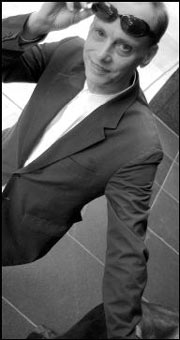John Waters is sure of who he is. He speaks John Waters. He acts John Waters. If you think that’s a breeze, interview another filmmaker—you’ll often find someone who makes Scooby Doo but talks Potemkin. Which isn’t to say that Waters isn’t smart or genuine—his comic anarchy, in person, reveals a real intellect at ease with itself and that probably was at ease with itself when he first started making his trash epics in 1964 (reaching an apex with that notorious dog turd in 1972’s Pink Flamingos). A conversation with Waters calmly speeds ahead (he doesn’t need you) and swerves back on several unexpected loops. Like his movies or not, you like him—and his flamboyant irreverence, which continues to both meet and defy expectations (a goal the rest of us should probably be shooting for). Oh—and he doesn’t cast people just because they’re outrageous.
Seattle Weekly: What’s the line for you then [in casting actors]?
John Waters: They have to have done something with wit. They have to be an original. Monica [Lewinsky’s] famous, but—well, she did rim the President. It says that, in the [investigation’s] footnotes: “oral/anal contact.” And they don’t mean “ear.” I sort of have rim respect for her for that. If she did rim the President, I think, “Well, good for you.” That’s hard to do in the White House: that big ass. I give her credit for that. But she doesn’t give lectures about that, she hasn’t turned that into part of her career. “Rimming the President”—it’d be a nice fireside talk for colleges. But she hasn’t done anything with that celebrity that is witty or ironic. If you make fun of whatever you want people to change [in their] thinking about you, it can go away.
What’s the difference for you between camp and just bad?
Well, camp—does anybody say that except older homosexuals in an antique shop talking about Rita Hayworth?
Well, it’s been co-opted—people do use it all the time.
Yeah, in Hollywood it means “bad fag.” It’s a code word. Camp means gay people like it, and bad means that no one likes it. Regular audiences basically hate camp. There’s two things mainstream audiences hate: camp and surreal. They’re two things they hate, ’cause they don’t get it, and they think you’re making fun of them. And you are. In showbiz, it’s the worst word—it means gay and not a hit. Once Susan Sontag wrote about it, it was over. Camp was great when nobody knew what it is except smart gay people.
What do smart gay people know now?
Well, most smart people are gayly incorrect and cringe at some gay society thing[s]—the “rules” of gay life. I rebel from that, too. A heterosexual, gay-friendly bar is my favorite, where it’s 75 percent gay and 25 percent really cute, cool straight people. And they play punk rock music so all the disco queens come in and say, ‘Oh, I hate this music.’
When I started, gay bars were so square. You know, they were just horrible. I walked in and thought, ‘Oh, my God, I might be queer but I’m not this.’ But drugs perked it up. When gay people started taking drugs it got more interesting. I still don’t like all-gay bars. I don’t like separatism—I think it’s defeat. Some people, I wish they’d come in. I’m for “Coming In Day” for some people.
I’m the only gay man who’s never been to the gym or the baths. I’ve been to the glory hole. I mean, I’ve done worse.
Have you ever been in any of the cheesier mainstream magazines? You haven’t been on the cover of Ladies’ Home Journal yet, have you?
Melanie [Griffith] was on the cover of it for Cecil B. Demented, which I love. The only magazine I really want to be on the cover of is one that I will never be—Parade. That’s the only media goal I have left. And I tell every publicist that and they look at me, like, stupefied because they know they can’t get me on the cover. They’re not interested in people eating dog shit, so I will never be on the cover of Parade. Maybe it should say that on my tombstone: The Man Who Was Never on the Cover of Parade.









